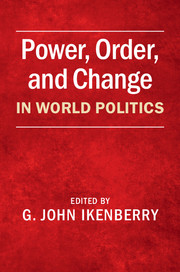Book contents
- Frontmatter
- Table of contents
- Contributors
- Acknowledgments
- Introduction: power, order, and change in world politics
- Part I Varieties of international order and strategies of rule
- Part II Power transition and the rise and decline of international order
- Part III Systems change and global order
- 7 Hegemony, nuclear weapons, and liberal hegemony
- 8 Brilliant but now wrong: a sociological and historical sociological assessment of Gilpin’s War and Change in World Politics
- 9 Nations, states, and empires
- Index
- References
7 - Hegemony, nuclear weapons, and liberal hegemony
Published online by Cambridge University Press: 05 September 2014
- Frontmatter
- Table of contents
- Contributors
- Acknowledgments
- Introduction: power, order, and change in world politics
- Part I Varieties of international order and strategies of rule
- Part II Power transition and the rise and decline of international order
- Part III Systems change and global order
- 7 Hegemony, nuclear weapons, and liberal hegemony
- 8 Brilliant but now wrong: a sociological and historical sociological assessment of Gilpin’s War and Change in World Politics
- 9 Nations, states, and empires
- Index
- References
Summary
Hegemony, nuclear weapons, and the American liberal order
The topic of hegemony has been of central concern to theorists of world politics at least since Thucydides, many of the leading figures of international theory have written about it, contemporary international theorists are still keenly thinking about it, and, with the relative decline in American power, it seems more relevant than ever. One of the leading works on the topic of hegemony, Robert Gilpin’s magisterial War and Change in World Politics was published at the end of the tumultuous decade of the 1970s in which it appeared that American power and the American liberal hegemonic order was waning fairly rapidly.
Often overlooked, however, is Gilpin’s larger project to understand large-scale and important change in human political life. Gilpin’s work on the logic of hegemonic systems, for which he is perhaps best known among IR scholars, was but one part of his larger body of work in which he addressed the range of theories about nuclear weapons, the implications of scientific-technological change for state power, and the ways in which state power and markets were changing in the era of American liberal hegemony and rapid economic “globalization.” What unites these works is Gilpin’s general quest to understand the interplay between changing material circumstances, particularly ones propelled by technological change, and various forms of political orders, internally and externally, particularly hierarchies and their interplay with more horizontal arrangements, particularly markets. And as an American writing in the American century, Gilpin has been keenly interested in exploring the prospects for the American liberal hegemony and the ways in which this order is like and unlike previous orders which have arisen and declined across history.
- Type
- Chapter
- Information
- Power, Order, and Change in World Politics , pp. 195 - 232Publisher: Cambridge University PressPrint publication year: 2014
References
- 3
- Cited by

